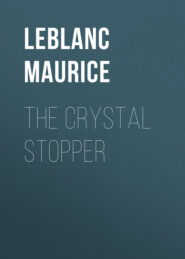По всем вопросам обращайтесь на: info@litportal.ru
(©) 2003-2025.
✖
813
Настройки чтения
Размер шрифта
Высота строк
Поля
"And suppose I refuse?"
"Idiot!"
"Yes, suppose I refuse? After all, what obliges me to submit to your will? What obliges me to accept a part which I do not know, but which I loathe in advance and feel ashamed of?"
"Idiot!" repeated Lupin.
And forcing Pierre Leduc back into his chair, he sat down beside him and, in the gentlest of voices:
"You quite forget, my dear young man, that you are not Pierre Leduc, but Gérard Baupré. That you bear the beautiful name of Pierre Leduc is due to the fact that you, Gérard Baupré, killed Pierre Leduc and robbed him of his individuality."
The young man bounded with indignation:
"You are mad! You know as well as I do that you conceived the whole plot.."
"Yes, I know that, of course; but the law doesn't know it; and what will the law say when I come forward with proof that the real Pierre Leduc died a violent death and that you have taken his place?"
The young man, overwhelmed with consternation, stammered:
"No one will believe you… Why should I have done that? With what object?"
"Idiot! The object is so self-evident that Weber himself could have perceived it. You lie when you say that you will not accept a part which you do not know. You know your part quite well. It is the part which Pierre Leduc would have played were he not dead."
"But Pierre Leduc, to me, to everybody, was only a name. Who was he? Who am I?"
"What difference can that make to you?"
"I want to know. I want to know what I am doing!"
"And, if you know, will you go straight ahead?"
"Yes, if the object of which you speak is worth it."
"If it were not, do you think I would take all this trouble?"
"Who am I? Whatever my destiny, you may be sure that I shall prove worthy of it. But I want to know. Who am I?"
Arsène Lupin took off his hat, bowed and said: "Hermann IV., Grand-duke of Zweibrucken-Veldenz, Prince of Berncastel, Elector of Treves and lord of all sorts of places."
Three days later, Arsène Lupin took Mrs. Kesselbach away in a motor-car in the direction of the frontier. The journey was accomplished in silence, Lupin remembered with emotion Dolores's terrified conduct and the words which she spoke in the house in the Rue des Vignes, when he was about to defend her against Altenheim's accomplices. And she must have remembered also, for she remained embarrassed and evidently perturbed in his presence.
In the evening they reached a small castle, all covered with creepers and flowers, roofed with an enormous slate cap and standing in a large garden full of ancestral trees.
Here Mrs. Kesselbach found Geneviève already installed, after a visit to the neighboring town, where she had engaged a staff of servants from among the country-people.
"This will be your residence, madame," said Lupin. "You are at Bruggen Castle. You will be quite safe here, while waiting the outcome of these events. I have written to Pierre Leduc and he will be your guest from to-morrow."
He started off again at once, drove to Veldenz and handed over to Count von Waldemar the famous letters which he had recaptured:
"You know my conditions, my dear Waldemar," said Lupin. "The first and most important thing is to restore the House of Zweibrucken-Veldenz and to reinstate the Grand-duke Hermann IV., in the grand-duchy."
"I shall open negotiations with the Council of Regency to-day. According to my information, it will not be a difficult matter. But this Grand-duke Hermann.."
"His Royal Highness is at present staying at Bruggen Castle, under the name of Pierre Leduc. I will supply all the necessary proofs of his identity."
That same evening, Lupin took the road back to Paris, with the intention of actively hurrying on the trial of Malreich and the seven scoundrels.
It would be wearisome to recapitulate the story of the case: the facts, down to the smallest details, are in the memory of one and all. It was one of those sensational events which still form a subject of conversation and discussion among the weather-beaten laborers in the remotest villages.
But what I wish to recall is the enormous part played by Lupin in the conduct of the case and in the incidents appertaining to the preliminary inquiry. As a matter of fact, it was he who managed the inquiry. From the very start, he took the place of the authorities, ordering police-searches, directing the measures to be taken, prescribing the questions to be put to the prisoners, assuming the responsibility for everything.
We can all remember the universal amazement when, morning after morning, we read in the papers those letters, so irresistible in their masterly logic, signed, by turns:
"ARSÈNE LUPIN, Examining-magistrate."
"ARSÈNE LUPIN, Public Prosecutor."
"ARSÈNE LUPIN, Minister of Justice."
"ARSÈNE LUPIN, Copper."
He flung himself into the business with a spirit, an ardor, a violence, even, that was astonishing in one usually so full of light-hearted chaff and, when all was said, so naturally disposed by temperament to display a certain professional indulgence.
No, this time he was prompted by hatred.
He hated Louis de Malreich, that bloodthirsty scoundrel, that foul brute, of whom he had always been afraid and who, even beaten, even in prison, still gave him that sensation of dread and repugnance which one feels at the sight of a reptile.
Besides, had not Malreich had the audacity to persecute Dolores?
"He has played and lost," said Lupin. "He shall pay for it with his head."
That was what he wanted for his terrible enemy: the scaffold, the bleak, dull morning when the blade of the guillotine slides down and kills..
It was a strange prisoner whom the examining-magistrate questioned for months on end between the four walls of his room, a strange figure, that bony man, with the skeleton face and the lifeless eyes!
He seemed quite out of himself. His thoughts were not there, but elsewhere. And he cared so little about answering!
"My name is Leon Massier."
That was the one sentence to which he confined himself.
And Lupin retorted.
"You lie. Leon Massier, born at Perigueux, left fatherless at the age of ten, died seven years ago. You took his papers. But you forgot his death-certificate. Here it is."
And Lupin sent a copy of the document to the public prosecutor.
"I am Leon Massier," declared the prisoner, once again.











